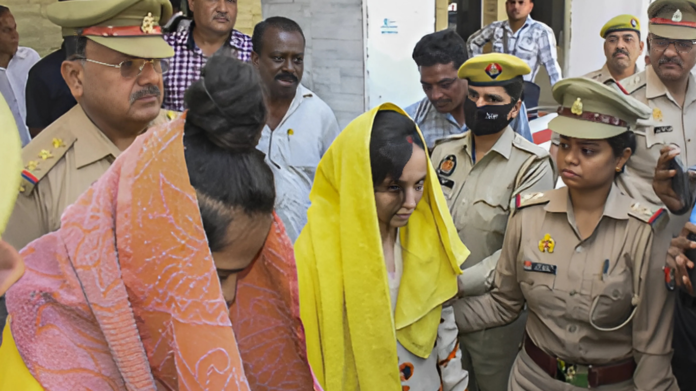As the investigation into the brutal killing of Merchant Navy officer Saurabh Rajput continues, a disturbing new development has surfaced. An AI-generated obscene video allegedly featuring Muskan Rastogi, Saurabh’s wife and a prime accused in the case, along with a police official, has gone viral—raising serious concerns about digital ethics, misinformation, and attempts to derail legal proceedings.
What We Know So Far
The video, shared on Instagram, falsely depicts Muskan Rastogi and Ramakant Pachauri, the in-charge of Brahmpuri Police Station, in a compromising position. Police have confirmed that the video is digitally fabricated using artificial intelligence, and was uploaded with malicious intent to tarnish reputations and possibly disrupt the ongoing investigation.
A complaint was filed by sub-inspector Karamveer Singh, leading to an FIR under Section 67 of the IT Act. Authorities are actively tracing the individual behind the Instagram handle ‘Priyanshu’, believed to be responsible for posting the fake video.
AI Misinformation and Public Discourse
Senior officials have emphasized that this misuse of AI technology could undermine justice and discredit institutions. The spread of such videos, especially amid an ongoing murder trial, showcases the urgent need for stronger digital safeguards and awareness about deepfake content.
Social Media Turns Crime Into Meme Content
Adding to the controversy, social media platforms are flooded with reels and memes referencing the ‘blue drum’ used in the disposal of the victim’s body. While some users have condemned this mockery of a serious crime, others continue to share and engage with insensitive content.
This growing trend of “meme-ifying” real crimes reflects a troubling digital culture where virality often overshadows empathy and ethical responsibility.
Legal and Jail Updates
According to Meerut Jail Superintendent Viresh Raj Sharma, both accused — Muskan Rastogi and her alleged partner Sahil Shukla — were sent to judicial custody on March 19. After ten days in observation barracks, they were shifted to the main barracks. Jail officials confirmed that Muskan’s family has refused to meet her, while Sahil was visited only by his grandmother.
The two have reportedly expressed a desire to stay in the same jail and are pursuing bail through advocate Rekha Jain. Meanwhile, forensic evidence such as blood samples, fingerprints, and the murder weapon are under examination to strengthen the prosecution’s case.
This case is not just about a gruesome crime—it also sheds light on:
-
The potential misuse of AI to spread disinformation.
-
The emotional toll of digital defamation, especially during sensitive legal proceedings.
-
The need for responsible digital behavior and media literacy among netizens.
As India steps into a tech-driven future, balancing innovation with ethics has never been more important.








